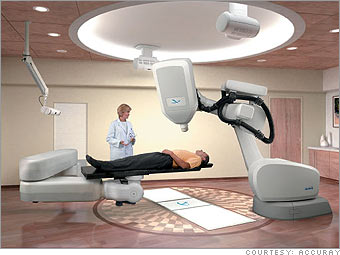Salary range: $200,000-$800,000
Experience/skills: Certified radiation oncologists must take three-week training course.
Perks: A broader base of patients and a long-term source of high-margin revenue
Who's hiring? Large hospitals, universities, pioneering small medical practices
For years San Diego radiation oncologist Donald Fuller relied on the standard tools of cancer therapy: radiation, chemotherapy, and surgery. But late last year, Fuller and several partners invested $4 million in a high-energy linear accelerator fixed to a robotic arm. The CyberKnife zaps radiation beams with submillimeter precision at tumors inside patients' bodies. After as many as five, one-hour treatments, tumors can disappear in a matter of days.
So-called radiosurgery has been used for years to treat cancer in the brain, where conventional operations are usually too risky. The CyberKnife--manufactured by Accuray and approved by the FDA in 2001 to treat tumors anywhere in the body--is only now reaching a broad population of patients with early-stage lung cancer, spinal tumors, and other cancers.
But it's turned Fuller, 49, into an entrepreneur. If he can treat 150 patients a year for the average insurance reimbursement of $19,000 each, he'll break even on his radiosurgery business by the end of 2008. Afterward, he could be looking at as much as $2.6 million a year in new revenue. "This is the way we are heading in medicine," Fuller says. "It's the way technology is taking us."
| |

